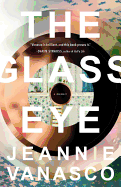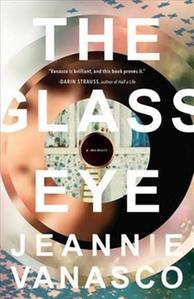
 Jeannie Vanasco's The Glass Eye is an intense and unforgettable memoir, as fascinating for its artistry as for its subject matter.
Jeannie Vanasco's The Glass Eye is an intense and unforgettable memoir, as fascinating for its artistry as for its subject matter.
Jeannie was 18 when her father died. Though her mother is beloved and sympathetically portrayed, it was her father who had been her hero, her perfect person. On his deathbed, Jeannie promised him she would write about him. Although there is no sign that he heard, let alone held her to it, this promise would haunt the increasingly troubled young woman for years to come.
Her father had lost his left eye and wore a prosthetic one, which was in fact plastic, "but sometimes I call it glass. Glass implies the ability to be broken." He lost his left vocal cord, too, and her mother loses hearing in her left ear. "What will be left of me if I lose her?" Jeannie's father had a daughter before her, from an earlier marriage, who died in a car accident. That daughter was Jeanne; the daughter who promised to write this book is Jeannie, pronounced the same but with an added i. She fills her book with meditations on glass and left.
The Glass Eye is not what the 18-year-old intended to write. In the years after her father dies, Jeannie appears to function at high levels: she receives several degrees and works for prestigious publications. However, she is hospitalized repeatedly, battling mental illness and devastating grief. Everything is about her father--"Of course I hallucinated my eyes had fallen out." A symptom of bipolar disorder (one of several diagnoses Jeannie receives) is a preoccupation with " 'clang associations,' connections between words dictated by sound rather than meaning," although for Jeannie, eye and i and I are also connected by meaning.
Vanasco pays compulsive attention to metaphors, and to the project of writing this memoir, which becomes a meta-exercise observing itself. She wonders, "What's my hindsight perspective? Is this my narrative present?" and plays with plot. She asks the professor in her memoir course, "What if it's about the promise to write the book?" The Glass Eye is indeed about Vanasco's promise, as it's about her father, grief, loss, her dead half-sister and reckoning with her own mental illness. And it's about itself: both memoir and writing-about-writing.
Lyric, haunted, smart and tortured, this is an obsessive love letter to a dead father as well as a singular work of literature. The Glass Eye will attract memoir fans and readers concerned with mental illness and bereavement, as well as writers concerned with craft. --Julia Jenkins, librarian and blogger at pagesofjulia
Shelf Talker: A devoted, tormented daughter eulogizes a beloved father in this thought-provoking and experimental memoir.

